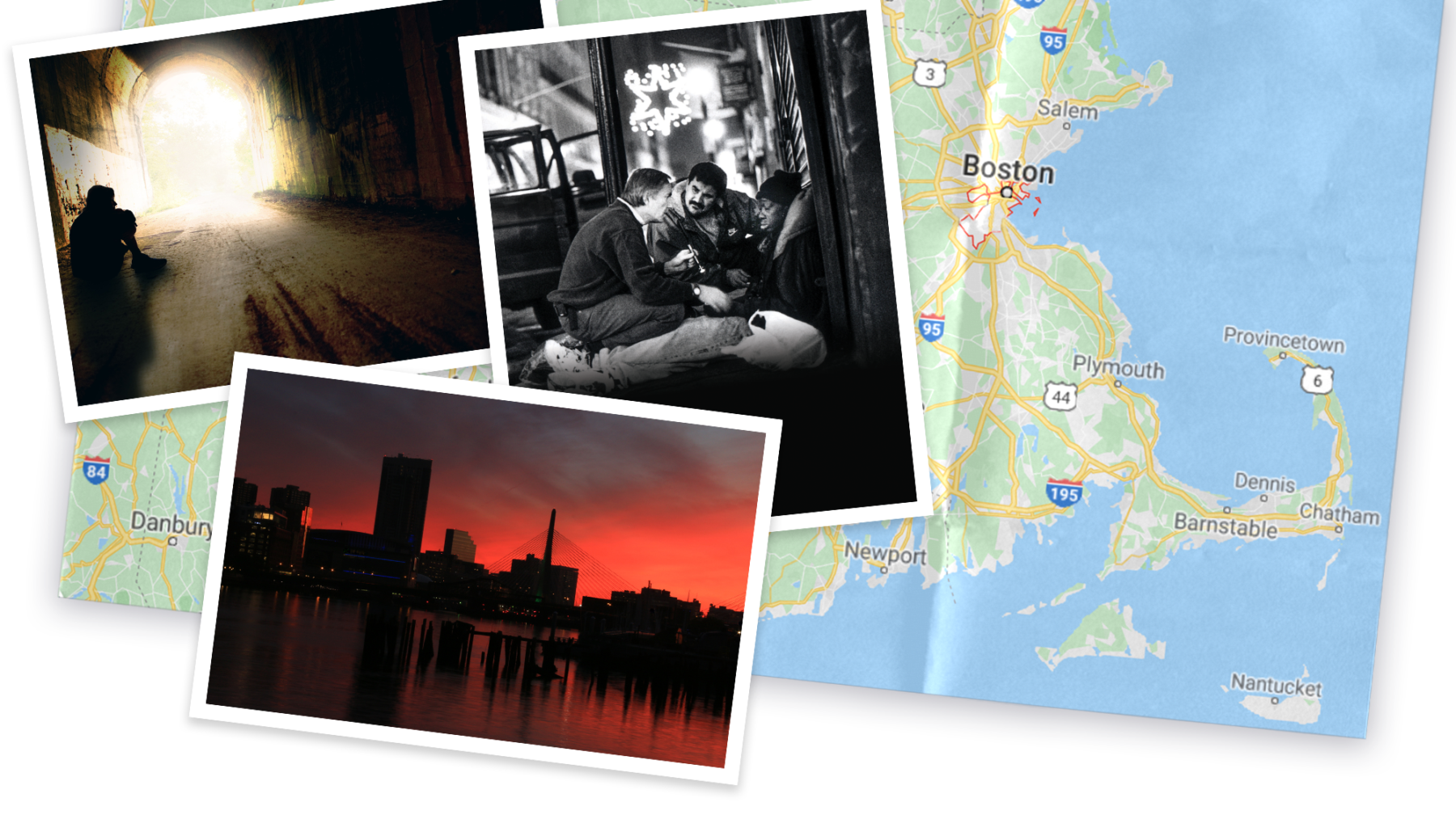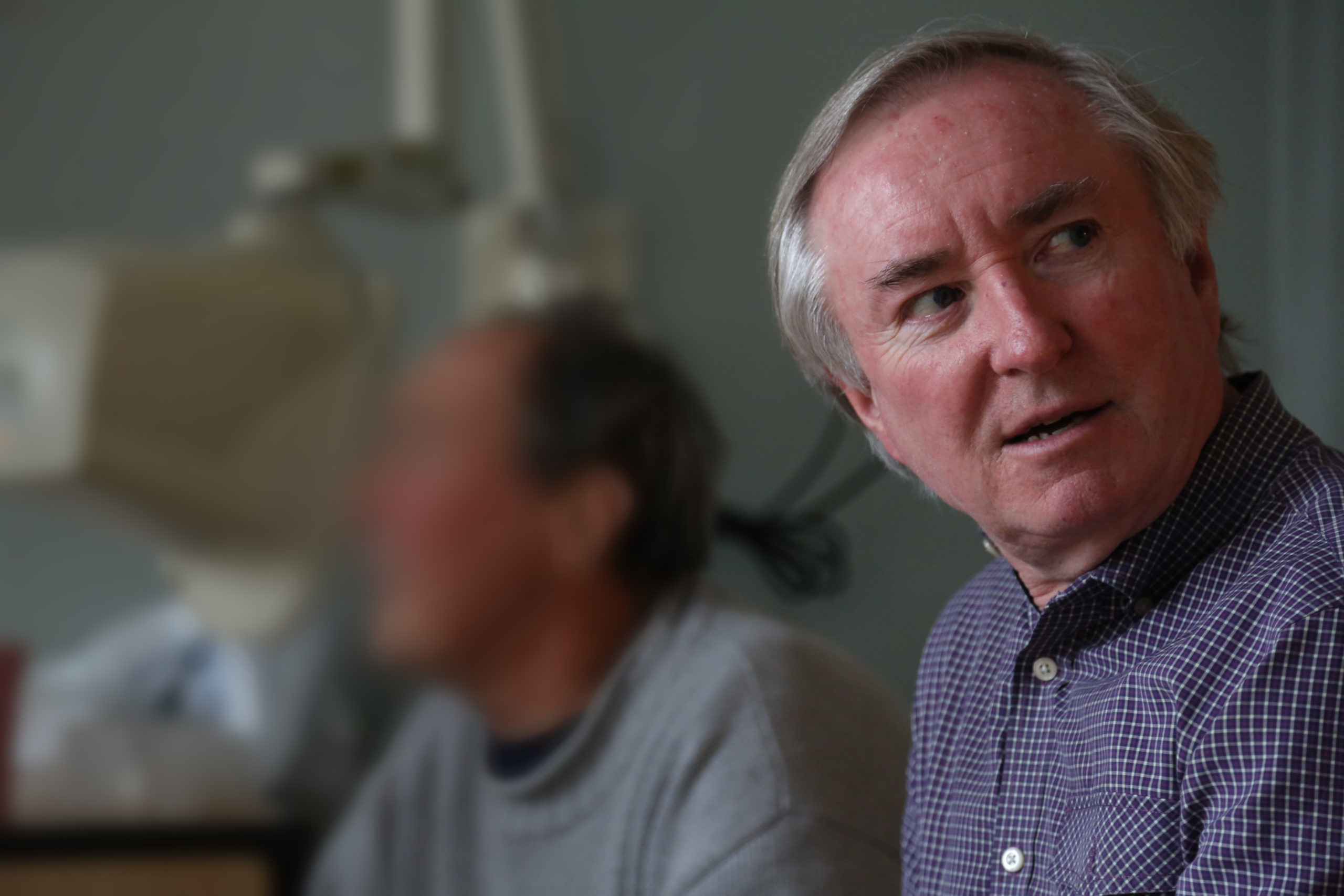
Boston Health Care for the Homeless founder Jim O’Connell has dedicated his life to helping the city’s most vulnerable citizens.
Photos courtesy of Rick Friedman, Boston Health Care for the Homeless Program and from iStock
Health and care
“When you spend time with people, you start to see their lives open up.”
Early in his career, Harvard Medical School graduate Jim O’Connell, M.D. ’82, had his life organized: Wrap up his last rotation as a senior resident in medicine overseeing the intensive care unit at Massachusetts General Hospital, start a fellowship, and launch into a career in oncology. But when Dr. John Potts, his chief of medicine, approached him with a one-year opportunity to help the hospital become more involved in the larger Boston community, he couldn’t pass it up — and the Boston Health Care for the Homeless Program (BHCHP) was born.
Thirty-five years later, that one-year opportunity has expanded into a lifetime of providing medical care to some of the city’s most vulnerable residents. Kick-started by a multi-city grant from the Robert Wood Johnson Foundation, today BHCHP partners with individuals and organizations across the hospital, shelter, government, and non-profit ecosystems of the Boston metropolitan area to help provide medical care for the city’s homeless population.
At the core of the organization is a program designed to take into account the experience and expertise of homeless people and homeless advocates. Roughly one-third of BHCHP’s board of directors is made up of individuals who have experienced homelessness.
“The first principle that came out of that [partnership] was that doctors, and certainly the healthcare system, didn’t understand that the immediacy of life on the streets and in the shelters made it really hard to keep [medical] appointments,” says O’Connell. “Health…is relegated to a distant priority by people struggling to survive each day, scouring for food or a bathroom, seeking a safe place to sleep, and finding a safe haven from the elements and the dangers on the streets.”
With a mandate to go directly to the people, BHCHP set up clinics at shelters, waiting until after meals were served and accommodations were secured before offering medical care. They also formed small teams that regularly travel to areas where homeless populations were known to congregate, providing medical care, conversation, or even just a cup of coffee. Building trust through a consistent presence, patience, and placing each individual’s needs first, whatever they may be, helped.
“One of the things we were taught early on is that nothing happens quickly,” says O’Connell. “You have to be there, be consistent, you have to engage people, you have to get to know them.
“I realized that most of the time we were caring for homeless people in the hospital, they didn’t trust us and were reluctant or afraid to share their stories. Our ability to offer the best of care was limited because we rarely understood what was truly going on. When [you] … spend time with people, you start to see their lives open up. As you get to know the stories of those who have spent years on the streets or in the shelters, you begin to see the stunning courage and resilience of those who have been dealt society’s worst possible hand.”

O’Connell treats a patient at the Barbara McInnis House, a 104-bed medical respite facility that BHCHP operates.
Photo courtesy of John Baynard, Boston Health Care for the Homeless Program
But, while medical school had trained O’Connell to be efficient, quick, and independent, it hadn’t prepared him to simultaneously attend to the complex web of social and societal challenges that impact homeless populations. Forming relationships and collaborations with a range of experts spanning social services, city government, and the non-profit worlds was a necessary step towards treating the whole patient.
“Almost everyone who is living chronically on the streets has survived horrific childhood adversity and trauma; 25 percent of the people living on the streets of Boston chronically cannot read or write. That’s not a problem of right now — that’s a social determinant of health that should have been addressed when they were 4 or 5 and 6 or 7 years old,” O’Connell explains.
“We as a society failed to address the failed schools, dangerous neighborhoods, and the persistent poverty and racism that limited their choices and opportunities, and we are now seeing the consequences of our collective failures.”
Although the challenges are real, O’Connell is quick to point out that the work brings more joy than sorrow. Once a solitary venture, BHCHP has grown to over 500 staff members, including almost 30 doctors working with an equal number of nurse practitioners and physician assistants and a host of nurses, social workers and support staff.
“You [are] only as effective as the network in which you work,” says O’Connell. “This is difficult and challenging work that can only be done by teamwork and community collaboration.
“Caring for vulnerable populations is now a dynamic career path attracting skilled and compassionate doctors, many of whom are former chief residents from the best training programs who could have chosen almost any specialty. While we may not change the world overnight or end homelessness in our society as yet, we are making a difference in the lives of the individuals we care for. … It’s been a daunting but rewarding opportunity that reminds us each day why we became doctors in the first place.”
This story is part of the To Serve Better series, exploring connections between Harvard and neighborhoods across the United States.





